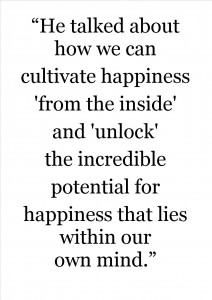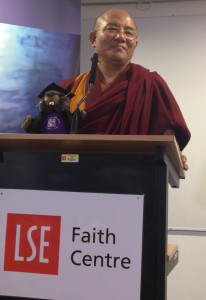What insights does the Tibetan Buddhist tradition have to share about the pursuit of happiness?
In the UK today one in six people suffer from depression or anxiety disorders. We enjoy a high standard of living but happiness is often illusive. How might the practice of meditation contribute towards a happier life and how integral is the religious or spiritual dimension of this practice?
 Khenpdo Sodargye has become one of the most eminent contemporary Buddhist masters.
Khenpdo Sodargye has become one of the most eminent contemporary Buddhist masters.
As a Tibetan lama, a Buddhist scholar and teacher, a prolific translator into Chinese, and a modern Buddhist thinker, he is renowned across Asia and the West for his interest in the integration of traditional Buddhist teachings with global issues and modern life.
Thomas Tozer, a postgraduate Philosophy student at LSE, shares his reflections on Khenpo Sodargye’s talk, organised by the LSE Faith Centre.
“It was a rare and special honour to attend the talk by Khenpo Sodargye. Despite having only been at the LSE for about a month, I had already attended many different talks – some very interesting, some not so much. But no talk was anything like the talk that I was about to hear from Khenpo.
He talked about how we can cultivate happiness ‘from the inside’ and ‘unlock’ the incredible potential for happiness that lies within our own mind. He talked about solving our problems by meditation and controlling our negative emotions, about poor people who practised Buddhism and were indescribably happy, and about rich people with no spiritual practice who were indescribably unhappy.
about poor people who practised Buddhism and were indescribably happy, and about rich people with no spiritual practice who were indescribably unhappy.
Interestingly, he did not at any point dismiss as irrelevant or misguided the attempt to improve people’s lives through politics and economics – he actually seemed quite supportive of these pursuits (so the LSE can breathe a sigh of relief!).
And yet, if we really want to be happy, if we really want to find happiness in the future as we age, as we lose the things we love, as we are ever more forced to face the reality of death, then, he said, we must learn how to control our mind and find happiness from within. How often at the LSE do you hear a talk about solving problems by controlling your own mind? For me, at least, it was the first time.
Perhaps my favourite part of the talk was when Khenpo was given an LSE beaver (a small and unbearably sweet teddy) as a mascot for his visit. A devoted spiritual practitioner, he was far from above the innocent play of enjoying the company of this young teddy-beaver! Playfully tugging its tail and derobing him, Khenpo’s beaming smile lit up the whole room as the Chinese translator enlightened the non Chinese speaking part of the audience. It was beautiful to see.
I cannot thank Khenpo enough for taking the time to visit us and to share some of his inspiring wisdom and compassion with us – how lucky we are! May this visit from a sincere Buddhist master be the first of many to come.”
If you enjoyed the talk, or are interested in learning more about meditation or Buddhism, please send an email to Thomas Tozer since he is setting up a Buddhist society at LSE. You can reach him at: t.tozer@lse.ac.uk.



